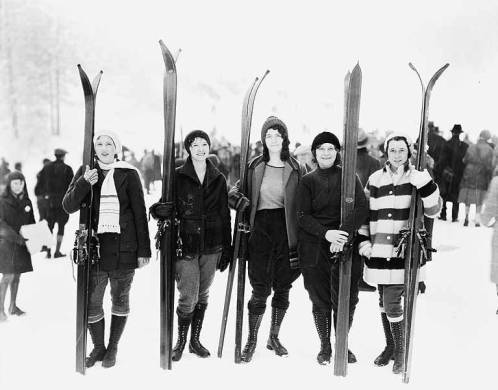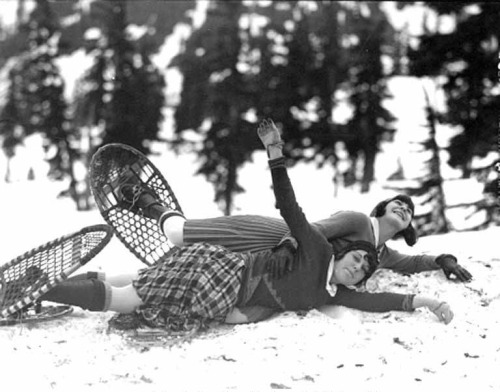#university of washington

Fandom is a giant online space place made up of thousands of tiny online places, and in this article, we’re going to talk about why it’s important for each author to find a tiny place of their own. Fandom corners are internet places where people connect in small numbers over highly niche interests. In our analysis of 29 hour-long interviews with authors, three central themes around fandom corners emerged: connection, encouragement and feedback. A fandom corner could take the form of a Discord server, a chat group on Facebook or Skype, a board on a less-traveled forum, or the right intersection of tags on AO3. Finding your corner means connecting with relatable people who make you feel comfortable, encourage you, and can give you feedback on your ideas and writing.
Connection and Comfort
Authors feel more connected in fandom corners because of the niche intersections of interests and identity that bring people together. For example, one author spoke with us about a set of Discord servers around a ship and fandom that brought together queer women:
“I particularly like that there’s sort of these little communities of queer women or mostly queer women or queer aligned groups… It’s just nice to talk to people who get it, who get why you’re so excited” (P4).
People in this group had common ground because they shared a traditionally underrepresented identity and they were into the same fandom. The term affinity has been used by internet researchers to describe shared interests and identities. In P4’s experience, affinity in the fandom corner created a safe environment to talk about writing queer sexuality in fanfiction.
“I’ve seen how friendly and nonjudgmental everyone is in responding [to others]. That makes me feel quite safe to go and ask them, ‘how do I write this thing?’ And it’s something that’s quite sort of deeply personal and intimate” (P4).
The community Discord provided authors with a safe place where they can connect to each other in a carefully moderated and curated group. But the feeling of small community extended into public spaces as well, where P4 noticed the same usernames coming up repeatedly in AO3 comments and on Tumblr. Although the overall community is large, the group of people interested in a few specific tags can be very small. P4 began connecting with others over private message.
“When I get the same people commenting on things that I’ve written, that makes me feel like I’m part of a little group… I’m part of the gang that does this. And privately talking to people who’s stuff I read who are other fans, it’s a quite nice feeling of belonging” (P4).
Finding a space where a small group of people connect over niche interests can help authors to feel like they belong, give them a comfortable place to talk about sensitive topics, and help them find people to connect to over private chat. As we discuss next, these connections and comfortable places are also support writing as authors receive encouragement and feedback from their communities.
Overcoming Writer’s Block
Fandom corners are helpful spaces for authors experiencing writer’s block. Almost everybody we interviewed mentioned a time where they felt stuck, unable to make forward progress, or that a scene was just not working. A common strategy was to take a short break from writing and come back to it, but sooner or later authors would turn to others to vent their frustrations or get help. A small community provides the perfect setting for authors to feel comfortable talking about their frustrations and supported by people who are close to them.
“There was a chat that I used to visit a lot… We will be very encouraging toward one another and to encourage others to just continue writing even though we were complaining” (P3).
Small groups provide a space where authors can commiserate about the sheer difficulty of writing, letting them vent out frustrations to an audience that really understands. The encouragement they receive helps them keep going. In addition, authors might send a snippet of their writing and receive fresh ideas that help them to get unstuck.
“I’d copy out a section and paste it into discord… they read the part where I was stuck and said just keep doing this, I think what you’ve done here is cool and maybe try doing this as well” (P12).
“Sometimes just, even though I’m very introverted, turning to my trusted group of friends and having them help me troubleshoot is very, um, it turns a problem into something that’s really fun and silly” (P10).
Because they were comfortable enough to share rough writing when they’re stuck, authors could get encouragement and new ideas to help them move forward. Communities also organized ‘sprint’ events, where writers held each other accountable for writing as much as they could for a short period of time.
“We will set time and be like “in the next 30 minutes, we are going to write as much as you can and when we come back, share the sentences”. So kinds of being forced to write. Some people come back be like “I wrote a thousand words” and I will be like “I got 10”. I will be like I didn’t come up with anything but they will be like “well those 10 words you didn’t have them before. So overall it’s a positive thing” (P3).
The closeness people feel in fandom corners creates an environment where they can commiserate, give each other encouragement, and be accountable for writing. This does a great deal to help authors break through and make progress when they’re feeling frustrated or stuck.
Feedback
A fandom corner is the perfect place for authors to get feedback on their writing. Since these small communities are places where people share interests and build relationships, authors felt that there was a high likelihood that others would be interested and respond to requests for feedback.
“There’s a couple of different communities where there’s people that I trust, and I might post a general message saying ‘Anyone willing to give a look at this, and tell me what you think?’ And then usually then somebody will reply” (P1).
Authors preferred to get feedback from people they already knew and trusted, especially when seeking feedback on unfinished work. So an online space frequented by those folks was a great place to ask for help. Authors would often get immediate responses when they posted to group chats, allowing them to ask for help as they were in-process with their writing.
“I’ll post a snippet of a scene and it will be hey how do you guys think about this part I am working on it right now. With the discord group they are very immediate. They’re really good for in the moment help…We have a very close friendly relationship” (P15).
Having an ongoing relationship with feedback providers also helped authors to get deeper, more thoughtful feedback. They felt understood by their in-group because of their shared context. If someone has read all of your prior fic, they start with a lot of common ground for giving feedback.
“They’ve all read my fic pretty in depth. So I can be like remember when this happened, or where should I go for this part of, you know, my next venture into this universe or whatever. They know what’s up there so I don’t have to reexplain everything or force them to watch the show or something, so they can understand what I’m thinking all the time” (P17).
The benefit of fandom corners boils down to being understood by others. Authors in these tight-knit communities mutually understand each others’ interests, their writing contexts, and the experience of writing fanfiction. That’s why others in the fandom corner will offer encouragement and comments to each other in public spaces like Tumblr and AO3.
“I feel like there’s a sort of comment exchanging between writers in fanfic, you know, I’ll comment on yours and you’ll comment on mine, cause we all know how much we love it.” (P4).
People maintain the same connection whether they’re in a small group chat or a public internet space. This begs the question: is the fandom corner the small group chat, or is it the tightly-connected people who are there? We’d love to hear your thoughts on this in the comments.
Conclusion
For every combination of tags, there is an opportunity for people to connect and form a small, close community around their shared interests. Wherever fandom corners emerge, people feel comfortable, build relationships and find support. These little groups are great places for authors to connect with each other, get encouragement when they’re stuck, and get helpful feedback on their in-progress writing. So go find your corner!
About This Series
This series is a breakdown of findings from an interview study run by a fanfiction research group within the department of Human Centered Design & Engineering at the University of Washington. In January and February 2019, we interviewed 29 fanfiction authors to understand how they connect with each other, build relationships, and seek out writing feedback. We learned profound lessons about the importance of building connections, the reciprocality of relationships and feedback, and the intersection of fandom with real life identity.
Authored by Regina Cheng and John Frens.
This work was first posted to tumblr in August & September 2019.
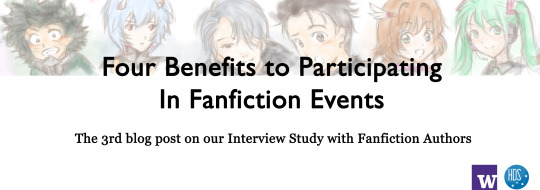
It is challenging for writers to get feedback for in-progress works. Fanfiction authors, especially those who recently started writing fanfiction, report facing various barriers connecting with feedback providers. Some frequently-mentioned barriers in our interviews include the anxiety of reaching out to people and requesting feedback, the difficulty identifying people with the right knowledge, skills and interests that they are looking for, and the lack of a community where they can ask for feedback. Fortunately, we’ve found fanfiction authors use multiple strategies to overcome these barriers. One important strategy we are going to talk about in this blog post is participating in fanfiction-related events.
During our interviews, 16 out of 29 authors mentioned events as an important part of their experience in fanfiction communities. These events include a range of experiences, such as “bangs” where artists and fanfiction authors create based on one another’s works, exchanges where authors share story prompts and write stories based on those, and many informal activities such as writing sprints, roleplays and many others. Participating in these events can result in positive effects on fanfiction authors in many different ways.
Exposure to the community
Getting exposure to new stories and authors is a direct benefit of participating in events. Many of the authors told us that they get to know more people and works in the community. “Secret santa for example is something that makes you possibly read something from someone you otherwise may not read before…” one author said. “There might be good works but I just don’t know because I just don’t read them. So in the whole thing you definitely get more exposure to people you haven’t read their work before.” - p9
Especially for authors who newly entered the community, contributing to events is a good way to get their work read by more people and become recognized in the community: “People aren’t going to see your story if you’re starting out. But if it is for a fest people will check the fest stories on AO3. The fest will be promoting your work. It’s a good way to get involved, a good way to get your work seen by people”. -p13
Connecting with beta readers and feedback providers
Authors get to find beta readers and feedback providers through participating in events. In many formal events, organizers will pair participating authors with beta readers who have similar interests: “They do a good job of making sure if you can’t find a beta, they’ll have a list where people are ready.” - p13 “At some point they’re going to ask the writers to send a rough draft of what they have, and send that to the beta readers. -p24”
For authors who’ve had difficulty finding good beta readers, it’s a great opportunity to try out working with one during an event. We heard stories from authors that they first met their long-term beta readers when they were paired with them in an event. After they worked together, they discovered they had matching tastes and could work well with each other, so they continued beta reading and feedback exchange for later works. “That was another sort of Big Bang event where they had originally been assigned to me as a beta to sort of critique and give feedback on my story as I was working,” one author said to us as they were describing how they first met their beta reader, “so I’d found that connection with them as someone who was really good at giving feedback and someone whose feedback I trusted.” -p1
Writing together and building community
Writing has long been regarded as an individual activity, but events provide fanfiction authors opportunities to write with others, and to build bonds with people in the community. Many events provide their own group chat for discussion such as a discord channel, where people carry out informal writing activities and chat about their in-progress stories.
Activities such as writing sprints may help authors with writers’ block. Authors encourage each others while writing:
“I was always on there (a discord channel for National Novel Writing Month) doing writing sprints with other writers, encouraging other writers being like hey even if you can’t write today, or like even if you didn’t hit your word count today, you still wrote something, which is better than zero…Because we’re also in the middle of a sprint together, we’d celebrate being like oh my god, it was ten minutes of hell but it was worth it.” -p20
Authors also discuss the writing process in event group chats. Compared to beta reading, this form of feedback exchange is less formal and structured, but equally beneficial:
“We would just throw ideas at each other, oh this character did that? It would be really cool if this person reacted in that way. Or I think that’s kind of out of character, maybe this should happen instead, kind of thing. Because it was an online group, just a group chat, it was just like immediate responses.” -p20
Many authors told us that they appreciate this kind of dynamic feedback exchange during an event. By actively reading about others’ progress and giving each other timely suggestions, authors feel a sense of community and close bond with people in the chat:
“It’s building something with my friends…I know these people better than some of the people who leave a wow I like that sort of comment on a story because there’s just more information shared, there’s more communication going on. It’s not just a simple exchange of a compliment and thank you. It’s not shallow.” -p12
Relationship beyond fanfiction
Many relationships between authors in the community stem from events. Giving feedback on fanfiction works is definitely an important part of these relationships, but they often develop into more personal connections and friendships. Working on fanfiction together during an event makes the bond between people stronger:
“You know something about them, you’ve written something for them, you end up spending a little bit of time… I followed some people that I did exchanges with for the Sherlock fandom. I follow them on Twitter and Tumblr still. I mean I didn’t rock to them all the time, but I know who they are and they know who I am, it’s a mutual sort of thing.” -p3
Working with others tends to increase mutual trust, and thus people become more open to discussing real life in addition to fandom topics. One author told us about people he had worked with during a roleplay event. “I spend a lot of time just talking about our days, venting our frustrations about whatever has happened in our lives or work.” - p12
Another author shared their story of meeting a later good friend through participating in a bang event: “They paired me with an artist that then I had conversations with over email. I got to know her better because we had a back and forth about making the art… One of the things we talked about, if I was ever in her area I would let her know so we could meet in person.” They then added, “And I don’t know if we followed each other on tumblr before but we definitely followed each other after that. I read her posts sort of more than I read about other people’s on tumblr. We will sometimes comment on each other’s posts, we have more of a connection than usual on tumblr.” -p18
Our findings suggest that participating in events can be beneficial to fanfiction authors, both with their writing and in many ways beyond writing. Authors may wish to consider participating in events to practice writing and become more connected to others.
We are actively posting blog posts about other findings from our interview study. Check out our blog later for more findings!

Online connection changes lives. Authors we interviewed found support, feedback, friendship and even lifelong partnership from people they met online through fandom. People online can help authors develop their writing by providing feedback both in public spaces like AO3 and in private chat. But getting connected is not always easy. Several authors encountered difficulties with making new connections, turned away from their communities, or never connected much with others online at all. Feelings of social anxiety stopped people from reaching out, communities that didn’t feel like safe spaces turned people away, and a culture of fear towards internet strangers made others difficult to trust. In this post, we’ll describe the barriers that can make it difficult to connect in the fanfiction community.
Social Anxiety
Talking to people is hard, and talking to people you can’t see on the other side of the computer screen can be even harder. An experience shared by many of our interviewees was a feeling of social anxiety. Social anxiety is a fear of judgment from others that manifests in many ways, for instance, the perception (without any particular evidence) that the person you are considering reaching out to is not interested or welcoming towards being contacted.
“I’m a shy person, so usually I may not [reach out]. I just say I feel embarrassed in speaking to people that seem cooler than me, more experienced… maybe I’m bothering them. Maybe they don’t see me as a friend, they have just been polite, this kind of thing” (P11).
Contacting someone with a higher profile, such as a prolific author or fan celebrity, amplified social anxiety. Interviewees held the perception that these folks are likely overwhelmed with contact already and therefore would be unwelcoming.
“I wouldn’t want to reach out to them because they’re on a different level than me in terms of popularity and probably get hundreds of messages all the time” (P18).
Authors who were reluctant to reach out oftentimes waited for others to contact them first. Or, instead of reaching out online, they relied on irl friends outside of the fandom for writing feedback. As a result of social anxiety, people don’t take that first step of reaching out to an online stranger, and therefore they don’t receive the benefits of a potential connection.
Unsafe Spaces
Writing and posting fanfiction in a public space is, in a way, baring your soul to complete strangers, and one sure way to stifle the soul-baring process was the institution of discriminatory rules that disproportionately affected a subset of the fan community. Restrictions on free expression created the feeling of an unsafe space, and it is this feeling that drove authors away from the community. During our interviews, authors discussed situations where they left communities because they felt the space was unsafe. The ban of NSFW content from Tumblr after its acquisition by Verizon, widely viewed as an attack on sexual expression that disproportionately affected queer people, was a recent example.
“When Tumblr banned not safe for work, it was really distressing for a bunch of us who don’t really fit on the very heteronormative sexual scale. So there was a lot of trying to figure out where we were going to go now, where we were, how would we stay connected, how would we continue to figure out and find stuff that we enjoyed” (P25).
Long-time fandom authors told us of similar exoduses from LiveJournal and Fanfiction.net after similar content bans and mass content deletions. These actions by platform owners divided fan communities and forced authors to find connections elsewhere.
In addition to institutional actions, individuals who made personal attacks or used hate speech also made authors feel unsafe. These antisocial actions happened in prominent fandom spaces.
“P27: There are people who write things that a fandom may consider controversial. This could cause them to get unhelpful criticism, rude and discouraging comments, so they will be constantly discouraged from writing.
Interviewer: That would happen on AO3?
P27: Both AO3 and tumblr, that’s where I know it happens.
Interviewer: And you’ve seen other people treated like that?
P27: Yes.” (P27).
One author spoke of an experience where she was berated for years by a reader because she wrote about drug addiction.
“Because [my fic is] about drug addiction, that brought a reaction that I really didn’t expect… sometimes [readers] impose their views. I got bullied for a couple of years, and even when I went on hiatus that person came back… they were imposing what they thought on me” (P7).
A single bully discouraged and pushed away this writer, even as they received an outpouring of messages from readers who connected with the story.
Another author discussed how controversy over a gay character sent them elsewhere:
“At the time I was writing about neon genesis evangelion. And it turns out at the end of the show, the main character Shinji Ikari is gay. Well, it’s revealed he has a thing for this guy. And I was writing this kind of thing too, and people got super angry. So they’d leave because, oh my God, he’s gay and that was terrible at the time. So, uh, yeah, I quickly left” (P8).
Fanfiction authors tackle difficult, important and controversial topics, and they need a space where they can find others to relate to without fear of harassment. If personal attacks, hate speech, or discriminatory rules are present, they may feel they can’t stay connected and will be forced to go elsewhere.
Personal Disclosure
Navigating personal disclosure can be difficult for authors when they’re interacting with internet strangers. Although authors disclosed deeply personal facts about themselves through fanfiction writing itself, some preferred to avoid connecting their fanfiction identity to their offline identity. Others wanted to protect themselves and their families from potential exposure on the internet. Identity and safety concerns associated with online personal disclosure slowed relationship building between authors and online friends.
Is this faceless individual actually a murderer, merely feigning deep interest in Star Trek and waiting for an opportunity to strike at unsuspecting fans?
Being raised to fear internet strangers was a shared experience among several participants in our interviews. Authors chose different degrees of disclosure they were comfortable with, and made nuanced decisions about who to reveal information about themselves to, where and when.
“There’s not any set guidelines. I think it really depends on who you talk to… how long have you been with the person? What type of things do you talk about? Do you feel like it’s safe to give that information?” (P21).
Oftentimes, the decision of whether to reveal a piece of identifying information had to be on-the-spot. P21 had to decide whether this person who wanted to be co-author was someone who could be trusted.
“… You kind of have to sometimes make a snap judgment and ultimately it worked out fine in this one case… it really does have to come down to instinct, gut, sometimes, there’s no kind of set formula to be sure” (P21).
Personal disclosure and relationship-building go hand-in-hand. But In an environment where personal disclosure requires caution and nuance, building connection and relationships becomes much more difficult.
To Be Continued…
There are powerful isolating elements like social anxiety, unsafe spaces and stranger danger keeping fanfiction authors apart. How do authors overcome these barriers to make connections, build relationships, exchange feedback and change lives? Stay tuned for the next part of our series on connection and feedback in fanfiction communities.
About This Series
This series is a breakdown of findings from an interview study run by a fanfiction research group within the department of Human Centered Design & Engineering at University of Washington. In January and February 2019, we interviewed 29 fanfiction authors to understand how they connect with each other, build relationships, and seek out writing feedback. We learned profound lessons about the importance of building connections, the reciprocality of relationships and feedback, and the intersection of fandom with real life identity.

In January and February 2019, our research group did an interview study on how fanfiction authors seek feedback for their fiction. We interviewed 29 fanfiction authors and learned about their insights on feedback and relationship with feedback providers. In this blog post, we are going to talk about our findings on the impact of public comments, and the particular positive outcomes of comments that contain specific thoughts and insights.
Comments Are Generally Valued
Fanfiction authors appreciated public comments on their works. “All I want for Christmas is comments, if you liked it please let me know,” (P2) one of the authors we interviewed once wrote in her author’s note. All kinds of comments are welcomed as long as they are conveyed in a friendly and respectful tone.
Concise positive comments, such as “wow”, “amazing”, “awwww this is so cute”, though simple and maybe not that informative, are still valuable to authors. Those comments “tell you that you’re hitting the right emotional chords, that you’ve been on the right track” (P21). “That’s really helpful.” One author said:
“If there’s a session where you’re getting absolutely none of that, that might prompt you. Like okay, I meant that to be really eliciting a certain emotional response and it wasn’t getting it, so that might also be a sign to go in and kind of work on that” (P21).
Comments Help New Authors Enter the Community
Comments were especially valuable to new writers in the fandom. They made authors feel welcomed in the community, and helped authors learn about community norms and writing styles. One author told us that when they posted their first work in a new fandom, comments helped them get connected in the new community:
“You enter into new fandoms, you’re writing for a new audience and you don’t really know anyone… I don’t really know the rules of this particular fandom and I don’t really know what people are going to think of my stories is going to fit. And that initial bit of support and positive feedback to get that on early works, and to feel, okay, I’ve just sort of arrived in this in this fandom, and in this community, but people are making me feel welcome, and making me feel like what I’m writing is valued and appreciated by people” (P1).
Specific Comments Are Particularly Appreciated
While in general all kinds of comments were welcomed, almost all of the authors we talked to expressed particular appreciation for comments in which the reader expressed opinions and thoughts about particular aspects of the story. One author talked about how she formed a personal practice to write substantive comments when reading others’ fictions:
“I try to copy certain lines while I’m reading and try to leave a substantial comment… and say I really liked your story because of ZYX…I do both because I’ve been writing fanfiction for a long time and I know it’s fun to have substantial comments. I do it because that’s what I like and I know it can make someone’s day” (P29).
Authors recognized the effort that readers put into substantial comments, so they regarded receiving those long specific comments as an honor:
“You don’t write a big long comment like that, if you’re not affected by something. Because it’s hard enough to get readers to click the Kudos button and just give me a little heart, let alone write a comment, let alone write a long detailed comment whenever that happens” (P14).
Specific Comments Recognize Authors’ Effort
Many authors mentioned that receiving long and specific comments made them feel that their effort had been recognized. When they were proud of a part of their story in particular, they liked to hear about whether the emotion and thoughts that they tried to convey impacted readers in the way they expected.
“It just feels great when I spent so much time working on something and working on a particular detail, I absolutely love hearing someone’s reaction to it, like, what specifically they liked about it… It’s great getting those compliments but I want to know about their experience living in the story that I’ve created” (P2).
“The most interesting and in depth sort of feedback, people really seem to connect with the characters and the characterization of the story and the writing of the story, which I really, really like. It’s very satisfying when you put a lot of effort into something and they actually noticed and they’re like, and they comment on it like, oh my God, the way you wrote this, the flow of it, the thing… that’s my own kink, hearing people say that they understood what I was writing and that they understood what I was going for” (P14).
Specific Comments Teach Authors about Writing
Being able to hear what the audience thought about their fiction was not only a joyful experience to fanfiction authors, but also a valuable learning opportunity. Authors learned from specific comments about whether their writing style and the direction of the story worked for their readers. Some regarded specific comments as feedback for parts of their writing that they were not sure about. One author told us they endured writer’s block when writing a certain character in their story. When they received positive comments on that character,
“they were commenting on my characterization for the character. And I was like ‘oh, thank you god,’ because I struggle with this particular character a lot” (P20).
The author was able to validate their writing from comments that specifically pointed to a characterization.
Specific Comments Connect Readers and Authors
Another important benefit of specific comments was that it fueled connection with readers. Specific comments elicited discussion between authors and readers. As one author said in the interview:
“I like having comments that are thoughtful and trying to analyze what I wrote, and are picking up what I put down basically… I usually respond to the comment and say thank you, and if they left analysis I talk back and forth” (P29).
These back-and-forth discussions lead to further connections outside the specific story.“I’ve made friends with a lot of people who started out just commenting on my fics a lot. You end up commenting back, and start talking” (P13). In some cases, these connections developed into later beta reading relationships and friendships. “Most of the people that I sent work to… they’ve made comments that are the right sort of comments I suppose…” one author said while telling us the story of meeting her beta readers,
“and so I sent work to them after that sort of built up a bit of a relationship by then so that I know what sort of person they are and what sort of comments they might make… I know that if I sent it to them, they will be looking for the sorts of things that I’m looking for them to look for. The comment that they’ve made tells me that they’re reading it the way I want a beta reader to read it” (P26).
Summary
Our findings about public comments suggest that it is more than valuable for fanfiction authors to receive comments, especially comments that provide thoughts and insights on specific aspects of the story and writing. We suggest that encouraging exchange of specific public comments will be beneficial to fanfiction communities.
We are actively posting blog posts about other findings from our interview study. Check out our blog later for more findings!

Introduction
The fanfiction community is huge and growing. It’s an intricate network of authors, reviewers, and readers contributing to the creation of some form of contemporary culture.
At the University of Washington, we are a group of researchers studying the fanfiction community and exploring the informal learning taking place there.
We were particularly interested in authors who are user-favorites on Fanfiction.Net. When a user favorites an author, there are certain characteristics of the author that the user finds intriguing. It could be that the story is very interesting or the style of writing of the author fascinates the reader. We aim to find which authors have been favorited the most and what factors correlate with a user favoriting an author.
This blog post explores the connection between users (in a particular fandom) and the authors that they have favorited on FanFiction.net. We us a metric to measure this relationship and try to find out how it correlates to other factors such as:
- Number of stories and chapters published by the authors
- Number of reviews received for the published stories
- Total number of words written by the author
- Number of favorites received
In our analysis below, we have used the PageRank algorithm on authors in the “Game of Thrones” fandom on Fanfiction.net. Each author has at least one favorite author, and we have exploited this detail for our analysis.
Motivation
Both of us are huge Game of Thrones fans. The exciting season 8 finale and the massive popularity of GoT on social media motivated us to explore this fandom. Our current goal is to analyze authors that have been favorited by users, and which features might have earned them favorites in the GoT fandom on Fanfiction.net. This analysis can pave the way for building a recommendation engine for users on Fanfiction.net.
Dataset
Our dataset has been scraped from Fanfiction.net. For the analysis, we used two primary tables - Story and Author_favorites. The ‘Story’ table contains data about the stories - including but not limited to a unique story identifier, user id, fandom id, number of reviews, number of followers, and so on. The ‘Author_favorites’ table contains data about the users and their favorited authors. Because the data in these tables were humongous, we limited our scope to the Game of Thrones fandom. We used a cluster of the data by only retrieving the data that consisted of stories written in the “Game of Thrones” fandom.
The dataset we used was formed by combining the User Favorite table, Fandom table, and Stories table. This gave us a table consisting of User IDs and their Favorited Author IDs, both belonging to the Game of Thrones fandom on Fanfiction.net.
Method and Process
PageRank is a billion-dollar algorithm which made Google what it is. Whilst the most popular application of PageRank is web search, it can be exploited in other areas as well. The web is a gigantic graph interconnected by the web links. And PageRank assigns a score of importance by calculating the ‘inlinks’ to a website. In our case, we have considered the dataset of users and their favorited authors as a form of a graph: Many users favorite authors and these users could be authors themselves who have been favorited by other users. Hence, every author will have none, one or more users who favorite them. And thus we can assign a score of ‘connectedness’ to the authors by using PageRank.
A visual representation of the graph is shown below. The blue dot at the center represents a user and the yellow dots represent the favorited users as well as the favorited users who have favorited other favorited users! When there are no out-links, the graph stops traversing.

Fig 1. Network of a user (of highest pagerank) and his/her favorite authors. Blue dot represents the user with highest PageRank and yellow dots are favorited authors
This graph shows the ‘connectedness’ amongst fanfiction authors. Now we attempt to determine which characteristics (features) have a good correlation with the PageRank score that we obtained. In simple words, we try to find out how closely related the PageRank score is with characteristics such as ‘number of reviews’, ‘total words written by the author’ and so on. How can this be done?
A simple way to do this is through Linear Regression. In linear regression, we plot the features against a single response and try to explain the relationship through a straight line. We are conducting our regression analysis by using metrics which depict an author’s output (quantity):
- Total words written by authors
- Number of stories and chapters published by the author
And those depicting the recognition received (quality) by the author in the form of:
- Number of reviews received
- Number of times the author’s stories have been favorited
The intuition behind our analysis is to discern if there is any correlation between the PageRank scores which is obtained through network analysis and the above-mentioned metrics.
Findings and Results
PageRank Distribution
The histogram below shows the distribution of PageRank scores. As expected the histogram follows the Power Law which means a small number of items are having high page rank scores while the majority of items is concentrated towards minimum scores.

Due to the nature of our distribution, we decided to strip off all the authors having a score above 0.5, as clearly they are outliers and may not represent how the majority of the community behaves. In fact, there is a possibility of authors with high page rank scores skewing our results.
Regression Analysis
The graph below shows a plot of PageRank score against total words and the line denotes the amount of correlation between the two. A positive slope indicates a positive correlation. Please note that even a slight increase in the PageRank makes a big difference. We can safely discern that as the authors increase their output, their score improves.

The second metric we used to measure an author’s output is Story-Chapter product which is the number of stories multiplied by the number of chapters. The reasoning behind multiplying both is that author adopt different styles for structuring their content. One author may have a story with multiple chapters, another one may write multiple stories with one chapter each. The plot below depicts positive correlation yet again.

Running regression over other variables yields the following output:


Our initial assumptions were correct and the features we selected are all indicators of a good PageRank score. However, which one of these is the best predictor?
Enter p-value. P-value helps to determine the level of significance of our results. In statistics, a p-value <0.05 typically indicates the trend is statistically significant. P-value only helps to infer significance which means all the variables we included in our study are important predictors for the page rank score. What p-value does tell us is how important these variables. To know which feature is better predictor, we use another metric called r-square. R-square helps to know the degree of correlation between two expected output and the actual output. It is conceived in terms of percentage.
The p-values obtained for the above features are as follows:
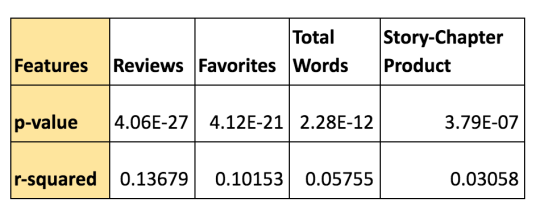
Based on our analysis, it’s safe to conclude the number of reviews received by the author indicates a higher probability of that author being favorited often.
Conclusion
In our analysis, we used four features, two of which Total Words and Story-Chapter product indicate the output (quantity) of an author while the other two; the number of reviews received and number of times the author’s works have been favorited indicate the quality of an author’s work. These features have been plotted against the page rank score which indicates the degree of an author’s presence in the community. Through data science and statistical analysis, we were able to discern that the quality of works and feedback received by an author is a better indicator than the output.
Future Work
Our analysis can help pave the way for a recommendation engine for new users. This recommendation engine would leverage the PageRank algorithm to recommend authors to a user which he/she would most likely favorite. Just like Google and Amazon recommend products to users, our recommendation engine would suggest authors for users depending on the fandom they like. To build a recommendation engine as effective as Google or Amazon would require tons of optimization and fine-tuning, hence we have kept this as future work for this project.
As for fanfiction enthusiasts ourselves, we want to connect with the community so that they can help us in our analysis. Inputs from the community are always encouraged as this would help us make a better recommendation engine. So please comment on your views on the following questions:
- What would you like to see recommended? We aim to recommend the Authors, but are open to suggestions!
- What parameters do you think would affect the action of a user favoriting an author? Do you think it’s just the story or could it be the number of reviews, genre or style of writing? Comment below! Our analysis indicates the number of reviews, however, it will be interesting to see if our analysis is aligning with what the community thinks.
- Which other fandoms do you want us to explore?
Hi! I’m Ruby, and I’m part of a group of researchers studying fanfiction communities through the University of Washington’s Human Centered Data Science Lab.
In November of 2017, we sent out a survey to all of you to learn a bit more about what motivates folks to participate in fanfiction communities, what kinds of activities you all participate in, and where your communities are. It’s been a hot minute, but I finally have some results to share!
We were absolutely blown away by your enthusiasm filling out our survey. We got a total of 1,888 responses from all over the world, which was way more than we ever could have imagined. Thank you all so much!
In this blog post, I’ll give a quick overview of participant demographicsand fan experience data. Then I’ll finish off with a preview of a few more blog posts to come!
Demographics
Survey participants’ demographic information matched well with previous fanfiction community censuses. (1,2,3,4) If you’re familiar with fandom spaces, this section shouldn’t be too much of a surprise.
Gender
The following chart represents the gender distribution of our participants. These percentages are not cumulative! Participants could check as many identities as applied to them.
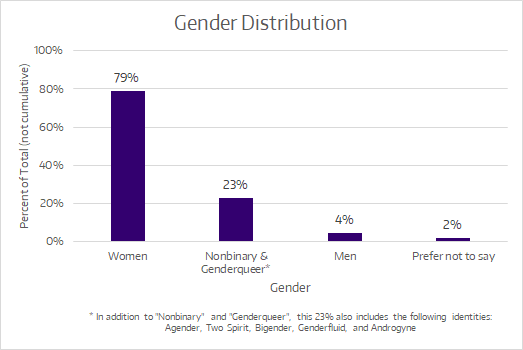
Gender identities that fall under the nonbinary and genderqueer umbrellas were aggregated for the purpose of this chart, but a comprehensive distribution will be shared in a more robust demographics post later on. Stay tuned!
Age
The age distribution of participant was pretty typical of fanfiction communities. This chart expresses the distribution as percentages. Children under 13 were excluded from filling out the survey.

Location
We collected some general location data and found that most of our participants were from the United States and Europe. That said, participants answered our survey from all over the globe. Here’s a map of where our participants were from.
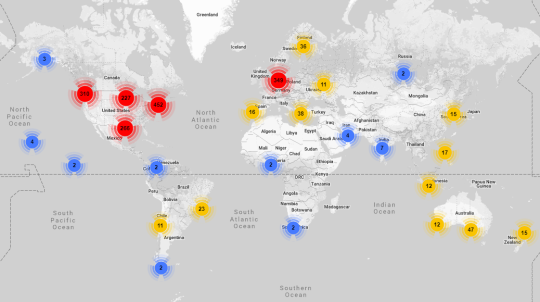
This map was created by aggregating coordinate data into different “buckets” based off of how close those locations were to one another. Each of the colored circles on the map represents one of these “buckets”. Any coordinate within a certain distance from the epicenter of each circle is included in the total displayed at the center of that circle.
To put that in context, the red circle over Germany doesn’t mean that there are 349 participants from Germany—it means that there are 349 participants from various locations around Europe, with the center of that bucket being located in Germany.
Blue circles represent buckets of 10 or fewer participants, yellow circles represent buckets of 100 or fewer participants, and red circles represent buckets of more than 100 participants.
Fandoms
Participants represented a great spread of different fandoms. Keep in mind that these results are from November 2017 through January 2018, so the fandoms represented in this word cloud are the ones that were popular among participants a year ago.

This word cloud only includes fandoms that were listed by ten or more participants. Although we did combine synonyms of fandom names (e.g. BNHA, My Hero Academia, MHA, etc. are synonyms of Boku no Hero Academia) we did not do any “meta-categorizing” (e.g. making Boku no Hero Academia a synonym of “Anime”). Therefore, the only fandoms included here are ones that were listed explicitly.
Fan Experiences
The biggest part of our survey delved into the activities that people in fanfiction communities participate in. We’ll give some more in-depth analysis of this data later, but for now, here’s a taste.
Personal History
First off, let’s talk about experience in terms of time. The following chart shows how long participants have been involved with online fanfiction communities.

Please keep in mind that each of these brackets are different sizes. The first bracket, “1 - 2 years”, represents only a 2-year span, while the fourth spans 10 years.
Which Fanfiction Communities?
Fans who filled out our survey were mainly based on tumblr and AO3, and most had used FanFiction.Net in the past. This is good to keep in mind, because the results from fans who favor other communities—say, Wattpad—might look very different. There is no one monolithic “fanfiction community”.
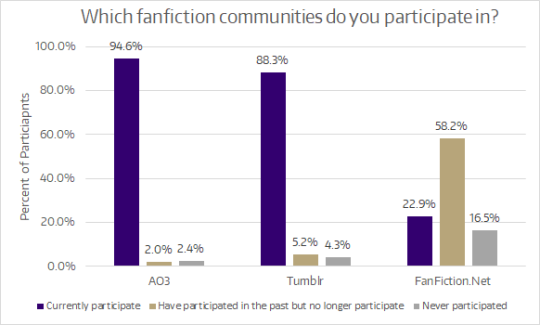
Activities
A significant portion of our survey questions asked participants to indicate how often they do various fanfiction-related activities. Although the complete list of activities was a lot longer, for this first overview post we’re just going to focus on three: reading fanfiction, writing fanfiction, and commenting on fanfiction.
Unsurprisingly,reading fanfiction was the most popular activity among our participants. About two-thirds of participants read fanfiction every day. Only 5 participants (0.3%) indicated that they’d never read fanfiction.

As for writing fanfiction, the distribution is much more even across the five frequency options. About a third of participants write fic at least once or twice a week, while another third write fic more infrequently (a couple times a month or less). The final third had not written fic or were no longer writing fic at the time of the survey.
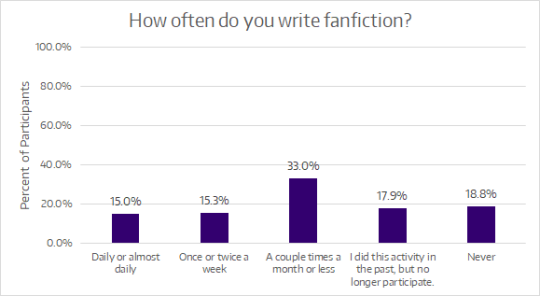
Leaving comments or reviews on fanfiction was a fairly ubiquitous activity. Nearly all participants (88.8%) reported that they do at least occasionally leave comments or reviews. Almost half of participants (46.7%) left comments at least once or twice a week.
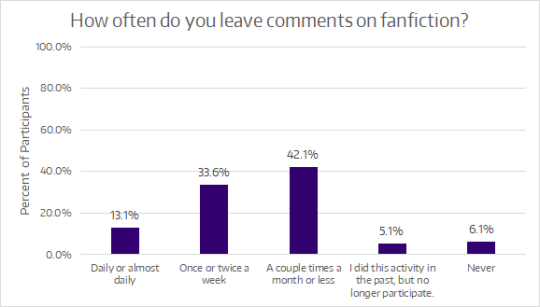
What’s Next?
Now that I’ve shown you all a sample of the results from the survey, what else is there to see?
In the coming months, my research team and I will continue to post about additional findings from the survey results. Some of these posts may cover topics such as:
- Demographics and activity information by fandom
- Comparing age and different activities in fanfiction communities
- Expanded demographic information, especially for gender
In addition, we have a significant amount of data from long responses to our survey question, “What motivates you to participate in fanfiction communities?” Participant responses were incredibly rich and detailed, and there’s a lot of fantastic information to draw from them.
For now, that’s a wrap! Thanks for taking a look at our results. If you have any questions or want clarification on any of the data shared here, please don’t hesitate to reply to this post, reblog with a comment, or send an ask. I’ll be happy to clear up any confusion, if I can.
May the force be with you all,
Ruby Davis
Human-Centered Data Science Lab
University of Washington
Post link



Cherry blossom season in Seattle
A bit of what I’ve been up to, where my head is at currently, and what my general plans are for the near and far future.
I have now lived in France for about 10 months. I return to the States sometime at the end of July and I can’t believe how incredibly fast it’s creeping up on me. As of May 1st I have been a college graduate for exactly 1 year and I’m having trouble wrapping my brain around that fact. It seems like just yesterday I was planning my graduation party and I had all my loved ones helping me celebrate and wishing me good luck for my upcoming travels. I can’t deny that thinking about it makes me a bit emotional. Not sad, but just choked up at the reality that life moves so quickly and I’m seeing how important it is to embrace each moment.

Since moving to Europe I have visited 9 countries and countless more cities within France. I hope to make at least one more trip before I leave, but it will depend on time and funds. At the very least I plan to see a few more small towns in France. I have had such an amazing time seeing new places, opening my mind to new cultures, languages, and incredibly fun experiences. In the coming weeks I will continue to explore the bits of Paris that I have had yet to see, cuddle my lovely Parisian friends a little tighter as our time together comes to an end, as well as welcome one of my best friends to Paris next week (!!!!)


As for after Paris, this is where things get a little fuzzy. I have no definite plans yet, but here are what my ideas and ultimate goals are:
I know many of my family members would like to keep me close and would love to see me come back to Florida. I won’t say I will ~never~ move back to Florida, but I do not see it happening in the near future. Right now my main plan is to join my friends in Seattle. I have always loved the idea of living on the west coast and I know that having an established community and group of amazing people to share a house with would make the transition that much better. I have been looking at research assistant positions with the University of Washington, and even looking into possible programs there for pursing a masters degree. A few weeks ago I had a scheduled skype interview with the hiring managers in one of the research departments, however they had to cancel after realizing that their project was moving quicker than they expected and they couldn’t wait for my late return date. This was pretty disappointing, but it also gave me a much needed boost of confidence from the fact that they were even considering me at all. They knew I wouldn’t be returning for months, but were still highly interested in having me join their department. The hiring manager has encouraged me to keep checking for future opportunities with them, and at least now I have a direct job contact when I do arrive in Seattle or apply for other positions with them in the future. So I’m staying positive and seeing what else is out there.
Having a job lined up before I make a huge move like this would be the ultimate ideal situation, but I know realistically this may not happen and I may very well have a temporary rough transition period. Another huge reason why having friends in a new city will be extremely helpful.

I’m really excited about starting my next big adventure after France. Weirdly it feels a lot scarier moving to a new state than moving to a totally new country. Being an au pair is (in my opinion) the ideal way to make such a huge move like this. I had every bit of security I could ever want: a loving family here to guide me in my times of need, an apartment and job already lined up, and a solid community of other au pairs that made initially making friends so much easier. Now I have to consider going back to ~adult~ life where rent, insurance, and student debt are going to drown me with responsibility.. but weirdly I’m not as stressed about it as I have been in previous years. I (hope) for the first time in my life these financial constraints won’t be quite as difficult since I will finally be able to work a full-time and well paying job (or at least better paying). I don’t expect that it will be exactly easy, however it is a nice feeling to consider these responsibilities and feel confident that I can make it work.
So here’s to moving on and moving up! Even if I’m not exploring new countries in the next year, I am equally (if not more) excited to explore more of my own country and get a better grasp on what I want to do for myself. This year has provided me with a lot of great personal insight and experiences that I know I will use to keep pushing myself forward.









